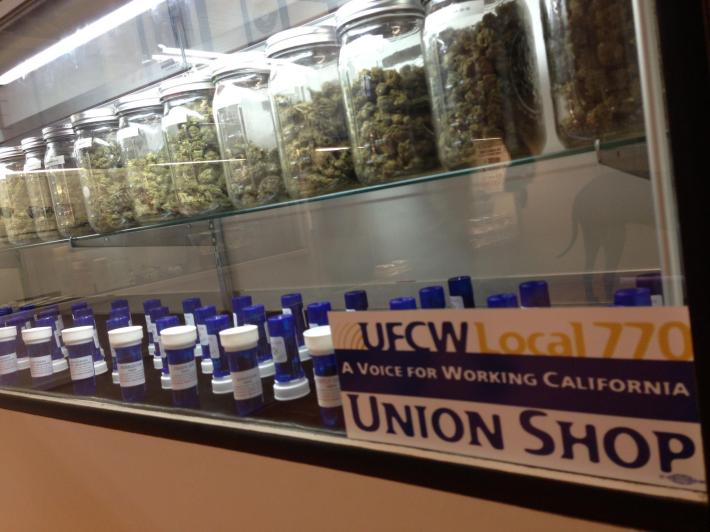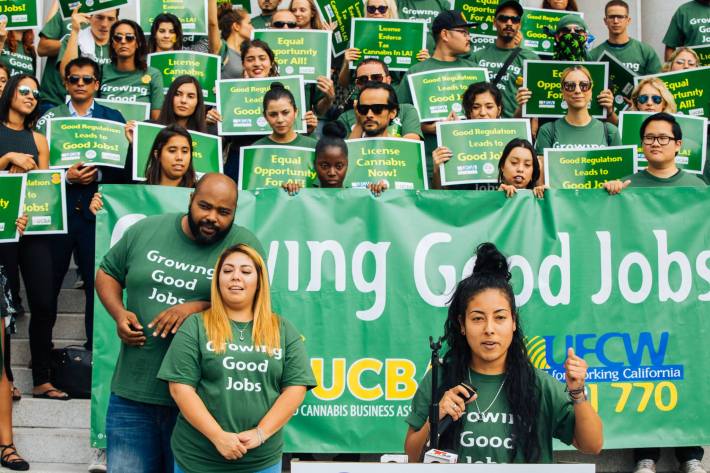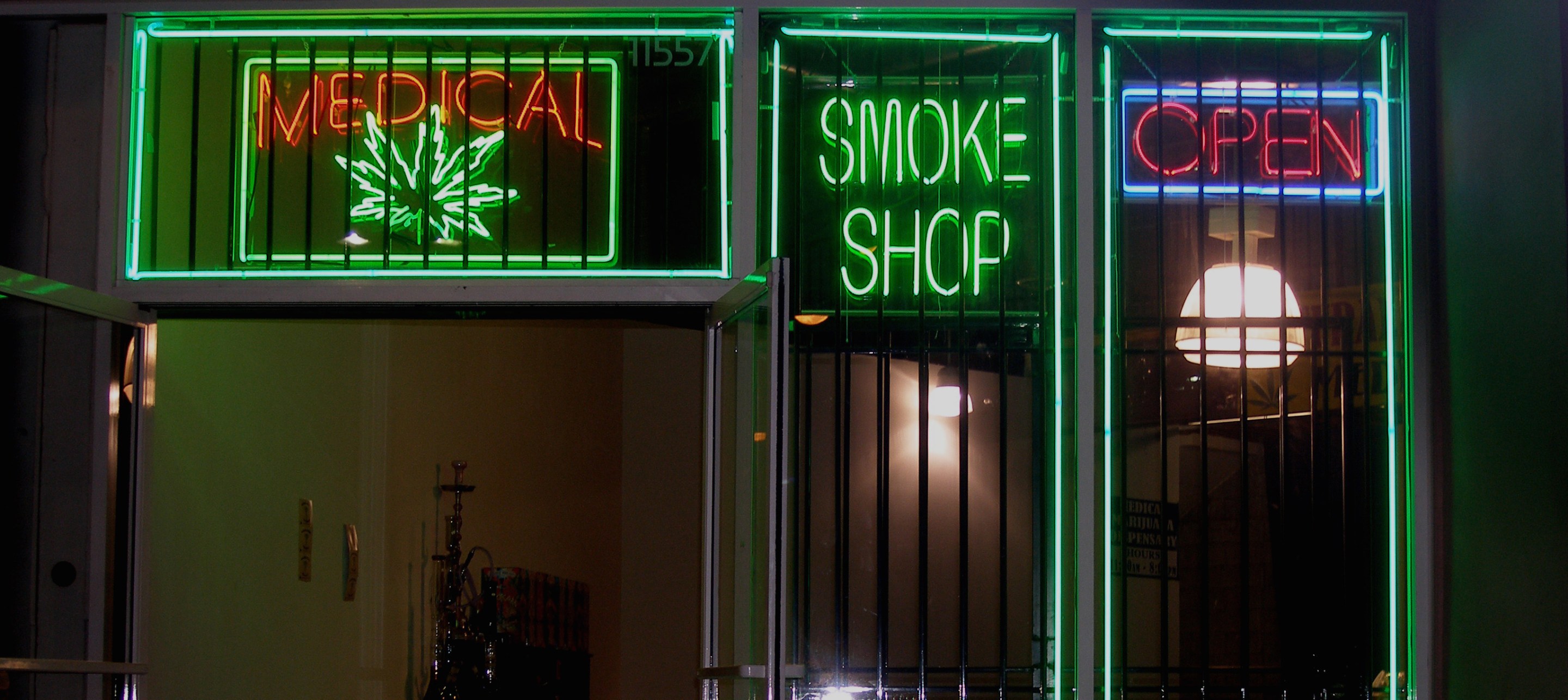[dropcap size=big]O[/dropcap]n Friday night, I was hanging out in a Long Beach warehouse full of budding cannabis entrepreneurs, medical marijuana patients, and consumers at an End of Cannabis Prohibition Party, hosted by Latinos for Cannabis (L4C). The event was called to mark the end of an era in which recreational weed sales are no longer prohibited by California law.
That occurs today, with the implementation of actions by voters — with Proposition 64, or the 2016 Adult-Use of Marijuana Act — as well as legislators, with the 2017 Medical and Adult Use Cannabis Regulation and Safety Act. Implementation, I should say, at least on paper.
As the commercial cannabis legal kick-off approached, there was definitely a lot of celebration filling the room and our lungs. But there was also a healthy dose of caution, especially when talking about what legal weed can mean for communities of color. Latinos for Cannabis is community group dedicated to bridging the gaps for communities hard-hit by the war on drugs, in terms of information about cannabis but also opportunities in the industry, which has had a rough and complicated history in our state.
There won’t be any official adult-use shops open today, January 1st, inside Los Angeles city limits.
“It’s an exciting moment,” said Maribel Garcia, a budtender and manager at California Caregivers Alliance in Silver Lake for more than seven years. “But the fact is, the end of prohibition will be a positive change for our communities only if we keep working together, keep informed, and keep involved.”
She knows the struggle well. Garcia is also a member of United Food and Commercial Workers (UFCW) Local 770, which has organized cannabis workers since 2011, and was instrumental in pushing for workers rights and social equity programs in L.A.’s new cannabis rules. (That’s right. There’s a union for weed workers, but more on that later.)
So in the spirit of keeping people informed, before you light up your joints in celebration, burn your medical recommendation, or even more — like take out a monstrous loan to start a cannabiz — here is the most pertinent info you might need in post-prohibition Los Angeles. As in, starting today.

Getting the Green
There won’t be any official adult-use shops open today, January 1st, inside Los Angeles city limits. Yes, that’s right. Nowhere you can legally show up with just an ID (if you are over 21) and get cannabis flower, edibles, or other products for fully recreational purposes.
This might be a good time to tell you, we never voted for “recreational” weed in California, we voted for “adult-use.” Adult-use is the word cannabis activists and then lawmakers started using to make sure that general cannabis use was taken more seriously, and to also avoid any association with kids.
While California voters may have said “(hell) yes” to adult-use cannabis in 2016, the state has left it up to cities and counties to set their own rules, which means there is much more uncertainty in the cannabis industry than really there ever was. Indeed, in the lead-up to full legalization in 2018 (today), cities and counties very slowly began to debate their local policy, all the while the state was setting its own.
‘Los Angeles will operate with flexibility while state and local laws synchronize.’
The newly-formed Bureau of Cannabis Control didn’t get to “emergency regulations” until November — and these are still not the permanent regulations expected at some point. In addition to that, cities and counties weren’t required to have anything decided by Jan. 1, so California’s “gray” cannabis system has been replaced by a whole lot of criss-crossing regulations and many more questions than answers.
As the clock approached midnight last night, there were only roughly 70 dispensaries in all of California granted adult-use temporary state licenses – including four in West Hollywood, eight in Santa Ana, and, unbelievably, none in L.A. city limits.

In Los Angeles, a City Council committee called Rules, Elections, Intergovernmental Relations, and Neighborhoods (REIN) held sixteen months of hearings and met with merchants, workers, advocates, and quite a few concerned residents (not always pro-pot) as it started to chart how to implement Proposition 64. With all this, L.A. didn’t set its own rules until Dec. 6, less than a month before they were supposed to go into effect.
The application to get a license to sell medical or adult-use in L.A. is not set to go online until Jan. 3, at the earliest. And you can’t get a state license from the new Bureau of Cannabis Control (BCC) without a city license.
Once all this gets rolling though, the first place you will be able to actually get your adult-use cannabis is a small set of 135 existing medical marijuana shops. These are a select group open since before 2007, who jumped through a lot of hoops in the last decade and were given “limited immunity” from prosecution under the city’s Proposition D, passed in 2012. The shops will be first in line to drop their applications January 3rd. Once they do, they can get temporary licenses and start selling again.
Don’t Drop that Rec
This set of “Prop D” folks are weighing their options: stay open those three (or more) days, or shut down altogether. Throughout the day on December 31, cannabis policy pages on Facebook were abuzz with back and forth about what the Prop D shops planned to do. It appeared the majority planned on continuing to operate as medical cannabis collectives, the version many of us have gotten used to, with recs and “donations,” as they were originally legalized with Prop. 215 in 1996.
That’s the case, for now. And the city seems to be cool with it.
“Los Angeles will operate with flexibility while state and local laws synchronize,” Vanessa Rodriguez, a spokeswoman for City Council President Herb Wesson, told the Los Angeles Times.
The state’s Bureau of Cannabis Control suggested they are still figuring out enforcement as well, and would probably only go after businesses on a “complaint”-driven model. L.A.’s Department of Cannabis Regulation has stated publicly they don’t plan on disrupting medical access at this moment. Like I said, don’t drop that rec.
At the same time, recent incidents further north have caused concern for owners and employees that state and local police may take things into their own hands, something the LAPD and L.A. County Sheriff definitely has a history with when it comes to weed. Just days ago, the California Highway Patrol in Mendocino County seized more than 1,875 pounds of pot from a locally-licensed distributor, and arrested two employees, claiming no cannabis activity should happen before the 1st.
Attorney Ariel Clark has worked for the cannabis industry since 2010, and has been involved in activism for far longer. Today’s uncertainty is all too familiar for people who work in weed, she said in a recent interview.
“What this moment reminds me of is many other times as an advocate and lawyer, when we we are all holding our breath waiting to see what a change in state of affairs — a new federal administration, a new city attorney, new laws — would bring,” Clark said.
But it’s also different now: “This is the most moving parts we’ve ever had.” That means going “moment by moment, watching carefully” for what different state and city policymakers, police, and other institutions say and do.
As the CHP arrests up North (and many years of unpredictable LAPD raids here) remind us, all these agencies don’t always agree on pot, and can disagree in ways that can seriously impact the lives of cannabis business owners, workers and patients. And of course, the lives of straight-up consumers.
Like Maribel Garcia, Clark has no plans on quitting the work of bringing people together to educate all these officials and the public on actually getting to a “regulated cannabis industry that does truly bring sustainable jobs and revenues to the city and state.”
But for now, fasten your seatbelts. “I know we won’t get there without some bumps and bruises,” Clark said.
Robert Chlala is chief cannabis correspondent for L.A. TACO. Follow him @RobertChlala.







